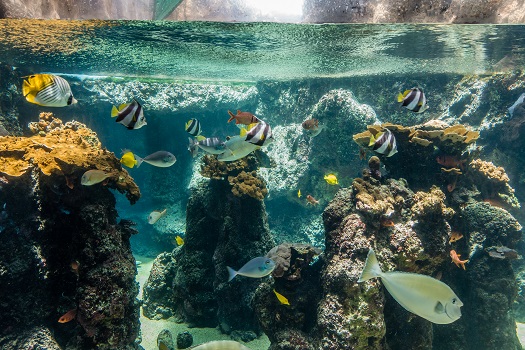- Your shopping cart is empty!
What Rocks Are Safe & Unsafe to Use in a Fish Tank?

Rock choice is extremely important for any aquarium, for visual appeal as well as functionality and safety for the fish. Different fish have different requirements for water pH and hardness, and both of those are affected by the rocks you place in your aquarium. Rocks also provide safe places for fish to hide and breed so they can feel at home in the tank. Freshwater tanks require very different water parameters than saltwater tanks, and the rock choices for these tanks are also vastly different.
Freshwater Aquarium Rocks
To maximize the comfort of most freshwater fish, softer water with lower pH is usually preferred. It’s best to avoid using rocks that are high in calcium or would otherwise cause water to become hard. Some of the best rocks to use for a freshwater aquarium are lava rocks, shale, slate, basalt rocks, and quartz. These sturdy rocks offer a great variety in appearance to fit in with any aquascape. Avoid using rocks that have a high salt or calcium content, such as limestone, marble, and dolomite. Shells and corals are also not suitable for most freshwater aquariums, except for African cichlid tanks, which prefer higher pH and hardness.
Saltwater Aquarium Rocks
The water requirements for saltwater fish are usually seen as more difficult to get right. These fish tend to require water that has a higher pH, hardness, and calcium. Manmade “Real Reef Rock” is the best to use because it looks beautiful with its stunning purple and red color, it isn’t taken from the ocean, it’s preloaded with beneficial bacteria, every piece is different, and there are absolutely zero creepy-crawlies that come with it. Also, petrified coral, live rocks, and dried reef rocks are options for a saltwater tank. Live rocks are skeletons of dead corals that contain millions of beneficial bacteria (or spaces for them), which can help your fish https://smartdrugsguide.org/buy-modafinil-online/ flourish in their captive environment. Dried reef rocks are essentially “dead” live rocks that no longer have the beneficial bacteria present. They may not offer as many benefits, but they’re still an option—just not an aesthetically pleasing option because they have a bone-white dead looking appearance that lasts for many months and allows ugly algae to grow on it. For a few dollars, just invest in the Real Reef Rock.
General Rock Safety Guidelines
Choosing the right rocks based on water conditions is great, but even more consideration goes into selecting the perfect rocks for your aquarium. All freshwater rocks should be thoroughly cleaned before use to make sure all debris and bacteria are removed. This includes rocks that have been pre-sterilized or sold by a shop, since they could have accumulated dust and other contaminants while sitting on a shelf waiting to be purchased. As a general rule, always research your fish to ensure you’re able to create the best possible environment to make your aquatic pets feel right at home.
Rocks to Always Avoid
Never use rocks that have been gathered from outside unless the proper precautions have been taken to identify and cleanse them first. Sharp rocks and rocks that crumble or break apart are also bad choices for an aquarium, as they may be hazardous to your fish.
For additional tips on choosing the safest rocks to use in your fish tank, get in touch with Aquatic Warehouse, a trusted provider of freshwater and saltwater aquarium supplies. We have everything you need to maintain a healthy and attractive aquarium. Give us a call today at 858-467-9297.
